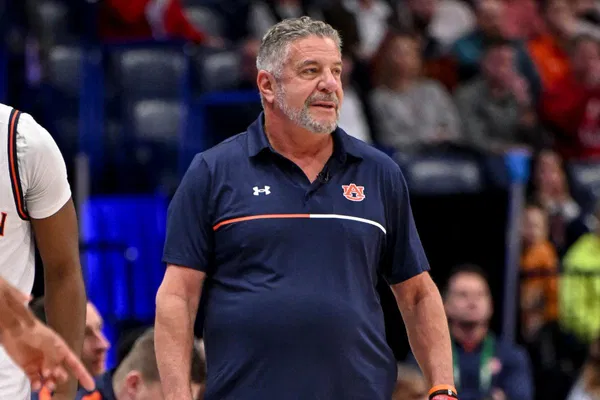
via Imago
NCAA, College League, USA Basketball: SEC Conference Tournament Semifinal – Tennessee vs Auburn Mar 15, 2025 Nashville, TN, USA Auburn Tigers head coach Bruce Pearl watches his team against the Tennessee Volunteers during the first half at Bridgestone Arena. Nashville Bridgestone Arena TN USA, EDITORIAL USE ONLY PUBLICATIONxINxGERxSUIxAUTxONLY Copyright: xStevexRobertsx 20250315_cec_ra1_017

via Imago
NCAA, College League, USA Basketball: SEC Conference Tournament Semifinal – Tennessee vs Auburn Mar 15, 2025 Nashville, TN, USA Auburn Tigers head coach Bruce Pearl watches his team against the Tennessee Volunteers during the first half at Bridgestone Arena. Nashville Bridgestone Arena TN USA, EDITORIAL USE ONLY PUBLICATIONxINxGERxSUIxAUTxONLY Copyright: xStevexRobertsx 20250315_cec_ra1_017
For just the second time ever, all four number 1 seeds made it to the Final Four in 2025. The only other time this happened prior? It was also in San Antonio in 2008. But there was another piece of history important for the coaches in there. A day before the big Final Four game against Florida Gators, Bruce Pearl gave the whole basketball world a history lesson. He talked about how the last Jewish coach to win the big dance was the legendary Larry Brown. Why was he talking about Jewish coaches? The 2025 big dance had a different storyline. One that got everyone talking.
Three of the four head coaches that stood were Jewish. Yep, you read that right!
Auburn’s Bruce Pearl. Florida’s Todd Golden. Duke’s Jon Scheyer. Three coaches chased one goal—cutting down the nets and making their program the best in the country. But there was more than just basketball linking them. All three share a special connection. “As a young Jewish boy growing up in Boston, I would have been proud” of three Jewish head coaches leading the sport, Pearl said a day before his side’s game against the Gators.
ADVERTISEMENT
Article continues below this ad
These three aren’t the only Jewish coaches who’ve made noise in March Madness. Bruce Pearl even reminded everyone about a legend from the past–Guy Lewis from Houston. “Not everybody knows that Guy Lewis at Houston was Jewish,” he said. Over the years, plenty of Jewish coaches have left their mark on college hoops. Pearl’s comments give us the perfect excuse to take a trip down memory lane.
Larry Brown
Some coaches shine in college hoops. Others leave their mark in the NBA. But dominating both worlds? That’s next to impossible! Just ask legends like John Calipari or Rick Pitino–they’ll tell you how tough that is. But Larry Brown? He cracked the code. A true coaching icon who found big-time success in both the NCAA and the NBA.

USA Today via Reuters
NCAA, College League, USA Basketball: NCAA Tournament First Round Portland Practice, Mar 16, 2022 Portland, OR, USA Memphis Tigers assistant coach Larry Brown during practice before the first round of the 2022 NCAA Tournament at Moda Center. Mandatory Credit: Jaime Valdez-USA TODAY Sports, 16.03.2022 11:07:10, 17907210, NCAA Basketball, Memphis Tigers, Larry Brown, Moda Center PUBLICATIONxINxGERxSUIxAUTxONLY Copyright: xJaimexValdezx 17907210
Larry Brown, a Jewish with maternal grandfather hailing from Minsk, Belarus, retired with a 1,275–965 coaching record across the ABA and NBA. But what really sets him apart? He’s the only coach in history to win both an NCAA championship and an NBA title. He took Kansas all the way in 1988 and then did it again with the Pistons in 2004, shocking the star-studded Lakers in the Finals. And if that’s not enough, he led eight different NBA teams to the playoffs. Eight! The only coach to do so till date.
Larry Brown’s coaching resume reads like a basketball dream tour! In college, he ran the show at programs like Kansas, UCLA, and SMU. In the NBA, he made his mark with big-name franchises like the Spurs, Nuggets, Pistons, Clippers, and Pacers. With such a stacked CV and decades of influence on the game, it’s no surprise that Brown was inducted into the Basketball Hall of Fame as a coach back on September 27, 2002. A well-deserved honor for one of the game’s greatest minds.
What’s your perspective on:
Is the success of Jewish coaches in March Madness a new era for college basketball?
Have an interesting take?
Nat Holman
Nat Holman, often called “Mr. Basketball,” was a true pioneer of the game. A master teacher, innovator, and strategist. In 1950, he led the CCNY Beavers to a historic Grand Slam, winning both the NCAA and NIT championships in the same season–a feat that can never be repeated since those tournaments are now held at the same time.

via Imago
THE FIRST BASKET, Bernie Fliegel left, coach Nat Holman center, 1939-1940, 2008. Laemmle/Zeller Films/Courtesy Everett Collection Laemmle/Zeller Films/Courtesy Everett Collection ACHTUNG AUFNAHMEDATUM GESCHÄTZT PUBLICATIONxINxGERxSUIxAUTxONLY Copyright: xCourtesyxEverettxCollectionx MCDFIBA EC006
For 37 years, Holman’s coaching philosophy was simple yet effective. His teams, often not filled with standout individual talent, were always well-drilled and fundamentally sound. Think of him as a chess master, constantly moving his players into the perfect positions, ensuring everything clicked on the court. Holman wasn’t just a coach– he was the professor, and his players were his students.
The New York native, born to Russian immigrant parents, retired with an impressive 421-190 coaching record, solidifying his place as one of basketball’s greats. His legacy in the game was cemented when he was inducted into the Naismith Memorial Basketball Hall of Fame in 1964.
Harry Litwack
“The Chief,” as he was known, was a Hall of Fame coach and a true innovator of the game, often credited with developing the box-and-one defense. He began by coaching Temple’s freshman team, where he posted a stunning 181-32 record from 1931 to 1951. In 1952, he became the Temple’s varsity head coach, leading the Owls to a 373-193 record over 21 years.
But Litwack’s accomplishments don’t end there. He had just one losing season in 21 years. Under his guidance, Temple made 13 postseason appearances, including the 1969 NIT championship and two NCAA Final Fours. On top of that, he led the Owls to eight 20-win seasons and six trips to the NCAA Tournament. A true legend in every sense! For his incredible contributions to the game, he was inducted into the Naismith Basketball Hall of Fame in 1973.
Bruce Pearl
When you are talking about Jew head coaches, how can you not talk about this man? Not the most successful yet, but definitely one of the most influential coaches of all time. Not many can change the fate of a struggling program like Bruce Pearl has with Auburn. “I’m humbled and blessed to be back in the game that I love. I don’t know how long it will take, but it’s time to rebuild the Auburn basketball program, and bring it to a level of excellence so many of the other teams on campus enjoy,” Pearl had said when he joined the Tigers in 2014.

via Imago
NCAA, College League, USA Basketball: NCAA Tournament South Regional-Michigan State at Auburn Mar 30, 2025 Atlanta, GA, USA Auburn Tigers head coach Bruce Pearl during the first half in the South Regional final of the 2025 NCAA tournament against the Michigan State Spartans at State Farm Arena. Atlanta State Farm Arena GA USA, EDITORIAL USE ONLY PUBLICATIONxINxGERxSUIxAUTxONLY Copyright: xDalexZaninex 20250330_jhp_sz2_0229
Six NCAA Tournament appearances, two Final Four trips, four SEC regular-season titles, two SEC Tournament championships, and a number 1 overall seed in the 2025 Big Dance–it’s safe to say Bruce Pearl has more than delivered on his promise. But his success didn’t stop at Auburn. He also led both Milwaukee and Tennessee to the tournament, and became the second fastest coach to reach 300 Division 1 wins!
But Pearl’s impact goes beyond the court! He co-founded and became the first president of the Jewish Coaches Association in 2005. It was created to mentor, promote, and advocate for Jewish coaches, and as Pearl puts it, to give younger coaches “a little bit of hope that they could be successful.” Pearl is undoubtedly one of the most vocal coaches advocating for Jewish rights in the country, and his efforts will continue to make an impact for years to come!
Red Auerbach
When we think of the Boston Celtics’ Golden Era, the first two names that come to mind are Bill Russell and Red Auerbach. It all started in 1950 when team owner Walter Brown hired Auerbach to turn around a struggling team that had just finished with a 22-46 record. At the time, Auerbach’s resume wasn’t anything extraordinary.

via Imago
Boston Celtics star Bill Russell is shown as he holds his coach Red Auerbach under the shower after they defeated the Lakers 95-93 to win their eighth straight NBA championship at the Boston Garden on April 28, 1966.(Associated Press)
He had brief stints at Duke, George Washington University, and the Tri-Cities Blackhawks (now the Atlanta Hawks), before being hired as the next head coach of the Boston Celtics. The rest, as they say, is history. Under Auerbach, the Celtics dominated the NBA, making the playoffs in all 16 seasons he coached and winning eight consecutive championships from 1959 to 1966.
His signature celebration? Lighting a “victory cigar” on the bench in the closing seconds of games, a move that delighted the Celtics fans but often infuriated the opposition. The franchise became the most successful history, but thanks to Auerbach’s antics– the most hated team as well! Auerbach retired as coach in 1966 and became the Celtics’ president and general manager. But the success didn’t stop there. Under his leadership, the Celtics added six more NBA titles to their collection. Auerbach’s impact on the game was undeniable, and in 1968, he was inducted into the Naismith Hall of Fame.
ADVERTISEMENT
Article continues below this ad
Honorable Mentions
There were other Jewish figures who made a significant impact on the game we all love. Sydney Greenberg played a key role in the selection of athletes and the funding for Canada’s participation in the 1985, 1989, and 1993 World Maccabiah Games in Israel. He served as the president of Basketball Canada from 1990 to 1998, overseeing the association that governs Canadian amateur basketball. His influence made a lasting mark on the Jewish basketball community.
Head coaches like Todd Golden and Jon Scheyer are making their mark in the 2025 Big Dance. Both began their careers as assistant coaches and have played crucial roles behind the scenes in shaping their teams’ success.
ADVERTISEMENT
Article continues below this ad
Have something to say?
Let the world know your perspective.
ADVERTISEMENT
ADVERTISEMENT
ADVERTISEMENT
ADVERTISEMENT


Is the success of Jewish coaches in March Madness a new era for college basketball?